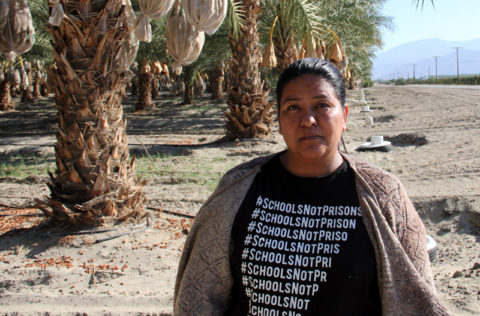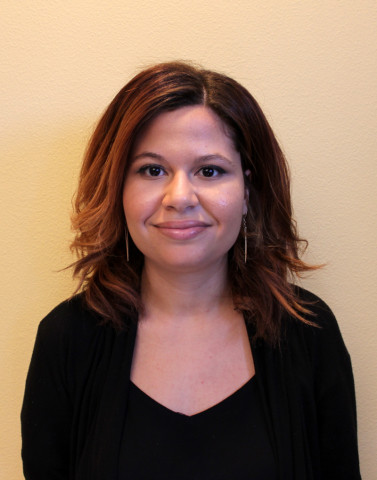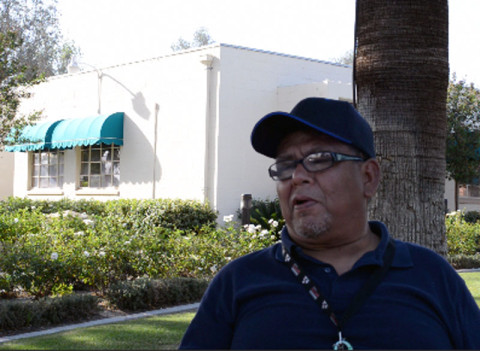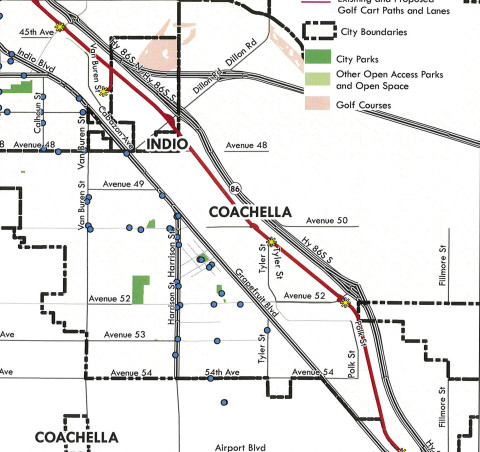Las necesidades de los residentes de las comunidades del valle de Coachella son muchas .Un grupo de organizaciones da un paso importante para su solución ,a continuación le presentamos la primera parte de una serie especial creada bajo la colaboración de Coachella Unicorporated y Notivalle.
(Above: Alicia Benito sits her family home in Mecca, Calif. Benito works 50-60 hours a week in the fields of the eastern Coachella Valley to help provide for her children. Image: Paulina Rojas/Coachella Unincorporated)
By Paulina Rojas
Editor’s Note: Stories about female farmworkers often examine issues experienced by these women in their work environments, in the fields. There has been extensive reporting on the abuse and harsh working conditions these women face daily. But we rarely get to see what life is like for these hardworking women at home, off the fields. This story uplifts the voices of women who find themselves stuck in cycles of poverty, unable to find any moment for rest, and it looks at how traditional gender roles in farmworker communities only perpetuate that cycle.
MECCA, Calif. — Alicia Benito’s shift picking limes in the fields in and around Mecca, a rural community about three hours east of Los Angeles, starts at 8 a.m. But like a lot of female farmworkers, her day gets going long before first light.
“First I have to make lunch for the children, my husband and myself,” said Benito, a wife and mother of three, ages 9, 7 and 1. The family shares a rented one story house in a neighborhood surrounded by farm fields. “At 6:30 a.m. I wake up the kids and get them ready. At 7 a.m. I drop off the oldest ones at the school bus stop and then I take my youngest one to daycare.”
Benito is short and soft spoken, her hands are small but strong. She appears shy and serious at first but just a few minutes into our conversation she smiles and cracks a joke. Her laughter immediately brightens the mood of an unusually cold and dark winter evening.
After her whirlwind morning routine, Benito, 27, heads to the fields where she spends 8 or more hours a day crouched under trees and exposed to the harsh desert sun. She does this six days a week, often working 50-60 hour work weeks.
Benito says the back-breaking labor takes a physical toll on her, leaving her exhausted at the end of each work day. But when she gets home, there’s still no time to rest. Benito’s nighttime routine starts by preparing food and taking care of her children.
“When I get home, I make dinner … and then it’s time to get [my children] ready for bed,” she said. “I would like to spend more time with my children but I just can’t, not with my schedule.”
Working in the fields is not a career path she would have chosen, had there been other options. But for many women in the eastern Coachella Valley, career opportunities are limited, especially for those without a high school degree.
For Benito, the surrounding fields presented the only option for employment.
Since I didn’t finish school, my only option was to go work in the fields.” – Benito
Accurate data on farmworkers living in the eastern Coachella Valley is difficult to find. However, the United States Department of Labor conducted a National Agricultural Workers (NAWS) survey throughout fiscal year 2013-14 and found that only 17 percent of survey respondents reported that they had completed high school. Only 5 percent reported that they had college degrees.
Benito dropped out of school in the 8th grade to help her parents, who are also farmworkers, care for her five siblings because they could not afford childcare. She started working in the fields five years ago after she and her husband, who works in construction, began struggling with mounting bills. It’s the only work she’s ever done.
“We had a lot needs, there were a lot bills that needed to be paid,” she said. “Since I didn’t finish school, my only option was to go work in the fields.”
It is a relentless schedule, but by making $400 a week, Benito and her husband are able to make ends meet for their family of five. It’s times when she can’t work, like when she was pregnant, that things become difficult. Female farmworkers do not receive maternity leave, so during those months during and after the pregnancy Benito’s family was forced to rely on her husband’s paycheck.
“It was very difficult during those times with just my husband bringing in money, we had to find ways to really reduce our spending,” she said.
Nancy Gonzalez, community leader and volunteer with Lideres Campesinas, a non-profit that aims to educate and empower female farmworkers, says it’s common for female farmworkers to carry both financial responsibilities and the responsibility of caring for the family at home.
“Women dedicate themselves only to working and forget about things like academics and learning English,” Gonzalez said.
She added this cycle affects the whole family. If mothers are not able to pursue an education or develop their language skills, it makes it difficult for them to become involved in their children’s education.
“They can’t help their children succeed because they don’t know the language,” Gonzalez said. “It is frustrating for both the mother and the child. Field work does not leave women with good options.”
Sandra Ramirez, 40, spent more than 10 years working in the agricultural industry, harvesting everything from dates to table grapes and mangoes. Three years ago she stopped working in the fields to spend more time with her four sons and to pursue a college degree.
“I decided to stop working in the fields, mostly for my sons,” she said in Spanish. “Sometimes they tell me that they want to go work there too and I tell them no.”

Like Benito, Ramirez’s work on and off the field left her with very little time for her children and herself.
“When I worked picking grapes, I would wake up at 4 a.m., make my lunch and head out to work at 5 a.m,” she said. “Then I would come home, make dinner, clean and just make sure that everything was in order.”
Ramirez said she has more time to be involved in her children’s education, now that she has stopped working in the fields. She has become a leader in her community, encouraging other parents in the eastern Coachella Valley to become involved in advocating for their children’s education.
Ramirez said leaving the fields was one of the most valuable lessons she was able to teach her sons.
“I want to show them that they have more options, that they can do more,” she said.
Though she no longer works in the fields, Ramirez said she sees how traditional gender roles that are prevalent in the eastern Coachella Valley add to the burden that female farmworkers face on and off of the fields.
“For women, it is harder. We can’t just come home, drink a beer, watch TV and relax,” she said. “We still have to make sure everything is done around the house.”
For women, it is harder. We can’t just come home, drink a beer, watch TV and relax” – Ramirez
Gonzalez said these traditional gender roles make it difficult for women in farmworker communities to see themselves as agents of change. But Lideres Campesinas is working to change things. The grassroots organization regularly holds meetings throughout the eastern Coachella Valley to educate women on their rights at work and at home.
“We teach women about physical and emotional abuse but also about equality in the home,” Gonzalez said, adding reaching the men is a tougher challenge. “[But] many of the men in our community are ‘machista’ and they don’t feel the need to come to our meetings.”
Gonzalez said they want to bring men into their meetings to show that equality in the home is important for the well-being of the whole family.
For now, working in the fields is a necessary sacrifice Benito makes so that her children can have a better future and hopefully become the first in their family to graduate from college.
Benito, who is originally from Mexico, recently gained citizenship and said she would someday like to go back to school.
“I don’t know exactly what I want to study but I would like to enroll in a program that I could finish in a few years,” she said. “With the kids I won’t have too much time to finish a long program.”
In the meantime, she plans to continue working the fields to support her family and hopefully ensure that her kids have other options.
“I have to work so we can have a better life, everything I do is for my kids,” she said. “I want them to study, I don’t want them to struggle as much as I have. I want them to achieve all the things that I haven’t.”
View this extended video interview with Sandra Ramirez to learn more about the lives of female farmworkers on and off the fields:
*This story was produced as part of the Marguerite Casey Foundation Equal Voice Journalism Fellowship.*
About the author:
 Paulina Rojas joined Coachella Uninc. as a beat reporter in February 2016 after working as a city reporter in the eastern Coachella Valley for more than a year. Although born and raised in New York City, Paulina feels right at home in the eastern Coachella Valley. She loves the warmth of the people and buying fresh bread from her favorite bakery in downtown Coachella. Paulina is a graduate of the University of Houston, and her work has appeared in The Las Vegas Review – Journal, The Houston Chronicle, HelloGiggles and Vivala. View her author page here.
Paulina Rojas joined Coachella Uninc. as a beat reporter in February 2016 after working as a city reporter in the eastern Coachella Valley for more than a year. Although born and raised in New York City, Paulina feels right at home in the eastern Coachella Valley. She loves the warmth of the people and buying fresh bread from her favorite bakery in downtown Coachella. Paulina is a graduate of the University of Houston, and her work has appeared in The Las Vegas Review – Journal, The Houston Chronicle, HelloGiggles and Vivala. View her author page here.
Palm Desert ,CA (Entravision) – Jovenes residentes del este del valle buscan cambios en sus comunidades.
]]>
[youtube]https://www.youtube.com/watch?v=cxmWBEKAO5c[/youtube]
]]>
Editor’s Note: The following video was produced in partnership with the Land Use Planning Awareness team, a community capacity building project designed to empower communities across the eastern Coachella Valley. Students from the LUPA project produced the video in preparation for a CVLink public workshop on March 19, 2015. CVLink is a proposed 50-mile active transportation trail that would stretch from Palm Springs/Desert Hot Springs to Coachella. For more information on the LUPA project and the NOVA Academy team visit their website.
[youtube]https://www.youtube.com/watch?v=an1P2uRETI4[/youtube]
]]>KARLA MARTINEZ AND AMBER AMAYA/Coachella Uninc
Coachella — Eastern Coachella Valley residents can expect to see a lot more of Hearts for Art’s bright red van. The mobile art program, run by the Old Town Artisan Studio, is putting on two weeklong clay camps in Mecca and Thermal during the month of August.
“We are going to teach [students] how to make sculptures and how to work on the wheel. We are also going to teach them how to glaze with low fires and high fires,” Triny Rios, an art instructor for Hearts for Arts, said. “The whole experience that you would get at the studio, they’re going to get it at the camp.”
Hearts for Art is partnering with the Desert Alliance for Community Empowerment to host one of the clay camps at the DACE facility in Thermal. This camp is open to students, ages 6 to 12, and will take place August 11-15.
The mobile art program also received a grant from Building Healthy Communities to put on a clay camp at the Boys & Girls Club in Mecca. This camp is specifically reserved for students at the Mecca location.
Rios is excited to bring the clay camps to students in the Eastern Coachella Valley. Working with clay, she said, teaches students their hands are powerful tools that can be used to for creating.
“If you look here to the Eastern Coachella Valley, you see a lot of agriculture. A lot of the parents are picking grapes, or working with their hands, and they’re working with the earth,” Rios said. “The way I see it, [working with clay is] a way to show kids you can work with your hands, but your hands aren’t just for work, they’re for creating. We are working with clay, specifically, because you’re coming back to the earth so it’s kind of this organic circle.”
Hearts for Art put on clay classes last year at the Raices office in Coachella, funded by another grant from Building Healthy Communities, but that was before the art program had their signature red van. Rios said the program would rent a U-Haul or pack everything into a car in order to teach classes in the East Valley. Thanks to a fundraiser at the beginning of 2014, the Old Town Artisan Studio was able to purchase the red van, and now the program is able to easily bring art to the East Valley.
The Old Town Artisan Studio also offers classes throughout the year at its studio in La Quinta. On Saturdays, the studio offers free classes — the free classes are set to start up again in September.
Visit the Old Town Artisan Studio’s website to view their class calendar, www.oldtownartisanstudio.org. Email [email protected] or call 760-777-1444 to find out when the Hearts for Art red van will be in the Eastern Coachella Valley again.
]]>
Coachella Uninc Asks: Do Cameras Make Parks Safer?
The City of Coachella currently has security cameras installed at approximately 75 percent of city parks. With plans to install more cameras in neighborhood parks, Coachella Unincorporated asked residents at De Oro Park (Parque de Oro) if they believe cameras are an effective means to prevent crime and vandalism.
Their answers may surprise you.
Reporters: Natalia Cervantes, Karla Martinez, Ivan Valenzuela
Digital Production: Andre Grandmain
Johnny Flores, Jr., captured the spirit of Coachella’s El Grito celebration with this photo slideshow. The city’s Mexican Independence Day event, which took place September 15, 2013, drew families from throughout the Eastern Coachella Valley to Rancho Las Flores Park for a day of food, fun, and entertainment.
]]>
For the past 13 years, the Coachella Valley Housing Coalition has provided the young residents of its low-income housing communities the opportunity to attend tennis camp at the prestigious Indian Wells Tennis Gardens.
In this video, Coachella Unincorporated shares a glimpse of what these young tennis enthusiasts have done twice a week for the past four weeks. Even the triple digit heat does not dampen their spirits on the court.
The Coachella Valley Housing Coalition is helps low low-income families improve their living conditions through advocacy, research, construction, and operation of housing and community development projects. CVHC has constructed nearly 4,000 homes and apartments for low-income households in Riverside County and Imperial County.
Digital Production by Aurora Saldivar and Ivan Delgado
]]>
Trinidad Arredondo, Program Manager for the Regional Access Project Foundation has always found a way to serve his community. Lately, he has helped improve the Eastern Coachella Valley by mentoring youth.
The R.A.P. Foundation provides funding, oversight, technical assistance and guidance to nonprofit community based organizations or collaborative groups, and other tax exempt agencies which serve the populations of eastern Riverside County in the areas of health, mental health and juvenile interventions.
For more information about the R.A.P. Foundation visit www.regionalaccessproject.org
Digital Production by Johnny Flores and Ivan Delgado.
Music by Longzijun.
]]>